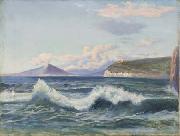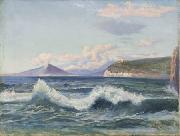
huile sur la toile, vraie saveur de vieux maîtres.
|
Amandus Adamson
|
|||
|
|
|||
| (12 November 1855, Uuga-Rätsepa, near Paldiski -26 June 1929, Paldiski) was an Estonian sculptor and painter. Born into a seafaring family, Adamson excelled in wood carving as a child. He moved to St. Petersburg in 1875 to study at the Imperial Academy of Arts under Alexander Bock. After graduation he continued to work as a sculptor and teacher in St. Petersburg, with an interruption from 1887 through 1891 to study in Paris and Italy, influenced by the French sculptors Jules Dalou and Jean-Baptiste Carpeaux. Adamson produced his best-known work in 1902. His Russalka Memorial, dedicated to the 177 lost sailors of the Ironclad warship Russalka, features a bronze angel on a slender column. The other work is architectural. His four allegorical bronzes for the Eliseyev department store in St. Petersburg (for architect Gavriil Baranovsky), and the French-style caryatids and finial figures for the Singer House (for architect Pavel Suzor) are major components of the "Russian Art Nouveau" visible along Nevsky Prospekt. | |||
|
|
|||
|
|
Bay of Naples new24/Amandus Adamson-744663.jpg ID de tableau:: 73487 |
1896(1896) Oil on canvas 39.7 X 52 cm (15.63 X 20.47 in) cjr | |
largeur taille |
pouces/CM |
||
|
X |
|
||
|
|
|||
|
Amandus Adamson
|
|||
|
|
|||
| (12 November 1855, Uuga-Rätsepa, near Paldiski -26 June 1929, Paldiski) was an Estonian sculptor and painter. Born into a seafaring family, Adamson excelled in wood carving as a child. He moved to St. Petersburg in 1875 to study at the Imperial Academy of Arts under Alexander Bock. After graduation he continued to work as a sculptor and teacher in St. Petersburg, with an interruption from 1887 through 1891 to study in Paris and Italy, influenced by the French sculptors Jules Dalou and Jean-Baptiste Carpeaux. Adamson produced his best-known work in 1902. His Russalka Memorial, dedicated to the 177 lost sailors of the Ironclad warship Russalka, features a bronze angel on a slender column. The other work is architectural. His four allegorical bronzes for the Eliseyev department store in St. Petersburg (for architect Gavriil Baranovsky), and the French-style caryatids and finial figures for the Singer House (for architect Pavel Suzor) are major components of the "Russian Art Nouveau" visible along Nevsky Prospekt. | |||
|
|
|||
|
|
Bay of Naples new24/Amandus Adamson-639599.jpg ID de tableau:: 75536 |
Date 1896(1896) Medium Oil on canvas Dimensions 39.7 X 52 cm (15.6 X 20.5 in) cyf | |
largeur taille |
pouces/CM |
||
|
X |
|
||
|
|
|||






